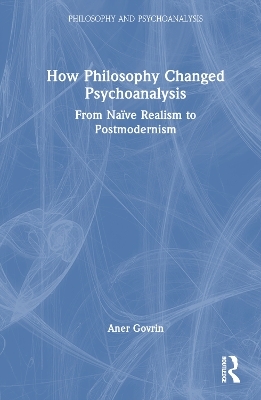
How Philosophy Changed Psychoanalysis
Routledge (Verlag)
978-1-032-80700-3 (ISBN)
Through this book, philosopher and psychoanalyst Aner Govrin demonstrates how psychoanalysis’ engagement with philosophy was crucial in the evolution of new psychoanalytic theories in three areas: perception of truth, developmental theories, and study of psychoanalytic treatment.
Beginning with a Freudian perspective, through ego psychology to the intersubjective and the relational approach, Govrin shows that philosophy seeps into psychoanalytic theory itself, becoming a constitutive factor. When we discuss psychoanalysis, we cannot do it without reference to philosophy, since virtually every sentence it has generated harks back to and is embedded in philosophy. Moving onto the Post-psychoanalytic Schools Era in the second part, this seminal volume provides a model for understanding the evolution of psychoanalytic thought in the postmodern era, where “sensibilities” like the relational approach and infant research replaced the orthodox psychoanalytic schools. Govrin also explores whether psychoanalysis is a branch of philosophy, how psychoanalysis progresses, what a psychoanalytic innovation is, and why mainstream psychoanalysis rejects neuropsychoanalysis.
Exploring the intricate relationship between psychoanalysis and philosophy, this book will be of interest to clinicians, scholars, teachers, and students of contemporary psychoanalysis across a broad spectrum of theoretical orientations, as well as those in philosophy of science, epistemology, and neuropsychoanalysis.
Aner Govrin is a psychoanalyst, philosopher, and clinical psychologist. He is the director of a doctoral program, “Psychoanalysis and Hermeneutics,” at The Program for Hermeneutics and Cultural Studies, Bar-Ilan University. He is a Tel-Aviv Institute for Contemporary Psychoanalysis (TAICP) member and Editor of the series Routledge Introductions to Contemporary Psychoanalysis.
Introduction: Is psychoanalysis a philosophy?
Part 1: How Philosophy Changed American Psychoanalysis?
Chapter 1: Freud's Compromising Positivism
Chapter 2: Classical Psychoanalysis
Chapter 3: Heinz Kohut's Self-Psychology
Postmodernism and Intersubjectivity
Chapter 4: The Intersubjective Approach
Chapter 5: The Relational Approach
Part 2: The Post-psychoanalytic Schools Era
Chapter 6: Back to Positivism: The Case of Neuropsychoanalysis
Chapter 7: Facts and Sensibilities: What Is a psychoanalytic Innovation?
Concluding Remarks
| Erscheinungsdatum | 12.09.2024 |
|---|---|
| Reihe/Serie | Philosophy and Psychoanalysis |
| Verlagsort | London |
| Sprache | englisch |
| Maße | 156 x 234 mm |
| Gewicht | 562 g |
| Themenwelt | Geisteswissenschaften ► Philosophie |
| Geisteswissenschaften ► Psychologie ► Psychoanalyse / Tiefenpsychologie | |
| Medizin / Pharmazie ► Medizinische Fachgebiete ► Psychiatrie / Psychotherapie | |
| ISBN-10 | 1-032-80700-8 / 1032807008 |
| ISBN-13 | 978-1-032-80700-3 / 9781032807003 |
| Zustand | Neuware |
| Haben Sie eine Frage zum Produkt? |
aus dem Bereich


